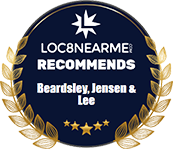
What Does It Take To Be An Expert
What qualifies a person to be an expert? Must the individual have a doctorate degree? If the individual has an advanced degree, is he or she automatically qualified to testify as an expert?
In Tosh v. Schwab, 743 N.W.2d 422 (S.D. 2007), plaintiff claimed he was
a victim of inappropriate police surveillance and interrogations that
were intended to inflict emotional distress upon him. To support his claim,
plaintiff offered the testimony of Dr. Gehm who proposed to give his opinion
that the procedures were improper
‘psychological intimidation and coercion’ that was ‘intentional,
willful, and outrageous.’ The defendant police officers challenged
the admissibility of Dr. Gehm’s testimony. Following a hearing,
the trial court determined Dr. Gehm was not qualified as an expert so
his testimony would not be allowed.
On appeal, the South Dakota Supreme Court began its analysis by referring to the applicable rule of evidence. SDCL 19-15-2 (Rule 702) states: [i]f scientific, technical, or other specialized knowledge will assist the trier of fact to understand the evidence or to determine a fact in issue, a witness qualified as an expert by knowledge, skill, experience, training, or education, may testify thereto in the form of an opinion or otherwise.
Under this rule, the Supreme Court explained the first inquiry is whether the individual is qualified as an expert on the issues to be addressed. Furthermore, the expert’s theory or method must qualify as scientific, technical, or specialized knowledge. The expert testimony must be competent, relevant, and reliable. The party offering the expert testimony bears the burden of establishing its admissibility.
The Court looked closely at Dr. Gehm’s background. He has a bachelors
degree in English and drama and a doctorate degree in sociology (not law
enforcement). He had never worked as a law enforcement officer. He had
no training in police work. He taught political science and sociology.
His consulting and research experience was in
criminal corrections and treatment.
The Court also noted that Dr. Gehm’s opinions were not subject to peer review; he had not published articles or books on the subjects at hand; and he was unable to articulate a standard the police officers should have followed in conducting surveillance and interrogations. Dr. Gehm had read some publications on the issues at hand. That, according to the Court, was not enough: Although Gehm read some publications on these subjects, reading a book alone does not make a person a qualified expert. Tosh at 429.
To qualify as an expert on the issues to be decided, there must be something in the individual’s education, training, experience, skills, or knowledge with regard to those specific issues that will make their testimony helpful to the jury or judge. Formal education is only one factor. It’s not required and, as in Tosh, may not even be sufficient. Experience alone, without regard to formal education, can be enough and can be the most persuasive. As applied to the Tosh case, for example, a retired police officer with experience in surveillance and interrogation would likely qualify as an expert and probably be very persuasive regardless of the officer’s formal education.
In some cases, you will need a highly educated individual with advanced degrees as well as significant experience on the particular issues to be decided. In others, formal education is really not important. It depends on the case and the issues to be decided. Does being “qualified” automatically make the expert “good” – one who can effectively evaluate the circumstances at issue and persuasively articulate his or her opinion in a way that helps your case? Certainly not, but that subject – what makes an expert “good” – is for another day.
To learn more about what it takes to be an expert, contact Beardsley Jensen & Lee today!

-
Even before I became a client I was taken care of. It was a long battle but I can honestly say I never felt worried, I knew I had an entire team working for me. It didn't matter at what point we were in the legal process, I was always well protected.- Shannon H.
-
This was my second case working with the Beardsley Law Team after an auto collision. They were knowledgeable, professional, and personable and kept me informed every step of the way. They are amazing!- Deanine R.
-
Brad Lee and his team are amazing and really stood up for us when we needed it! We always knew what was happening and he always took the time to explain the process and set clear expectations. No question or concern was too small.- Brad & Tara F.
-
I was in a severe workplace accident. Became permanently disabled. I lost everything. The team of Beardsley, Jensen & Lee went to bat for me. They answered every question I had. I do not know what I would have done without them.- Troy H.







